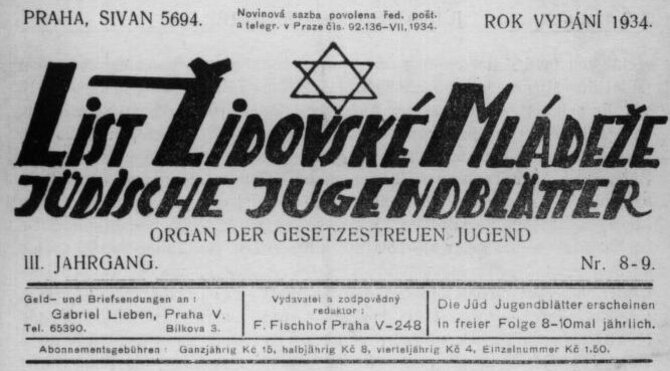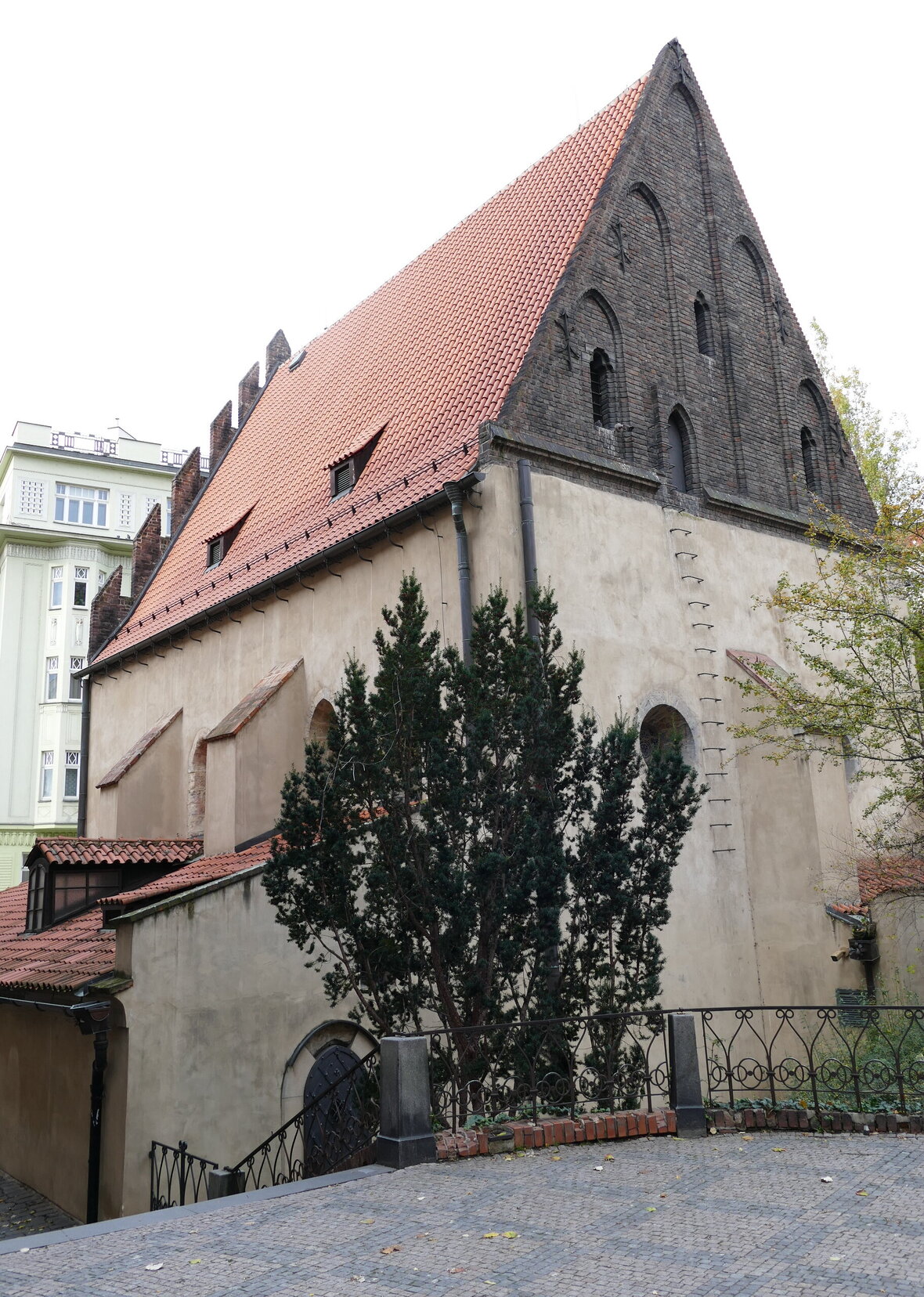Franz / František Fischhof
(1898 Satu Mare - 1958 New York)
The first volume of a copy of Pele Joez - a kind of code of conduct - written by Rabbi Eliezer Papo and printed in Vienna in 1876, contains a handwritten as well as a stamped ownership note of its obviously last rightful owner:
FRANZ FISCHHOF PRAHA V/39 Maiselová 17.
We have already encountered the name Franz Fischhof during our research in connection with other books that were not in his possession. He appears in the still existing documents as one of the employees who had to use their knowledge of Hebrew literature in the utilization of books under the compulsion of the National Socialists. This applies firstly to his activities in the Jewish Museum in Prague - known by the German occupiers as the Jewish Central Museum - and his work in the Terezín book collection group, the so-called Talmud-Kommando. It is striking that the estate of Rabbi Emil Davidovič, which we examined, contains several books whose owners played a role in these two book processing units.
Fischhof was born in Satu Mare, now part of Romania, near the Hungarian border, where there had been a large Jewish population since the 18th century. According to his son's statements in the restitution files of the German Federal Republic, Fischhof served in the Austro-Hungarian army during the First World War and subsequently worked as a merchant in the Viennese "Metall und Erz-Compagnie Baer und Sondheimer". A few sporadic newspaper articles provide information about his activities in the 1920s. Fischhof devoted himself intensively to Jewish youth work between Vienna and Bratislava during this time and was involved in the "Agudat Israel" and "Tiferet Bachurim" associations. One mission to which he dedicated himself was the placement of destitute Jewish boys from Vienna in Slovakian yeshivot.
Presumably in the early 1920s, Fischhof married Irma Rivka Straußmann, born in 1899 in the Hungarian-Czechoslovakian border town of Sátoraljaújhely (Hebr. שאטוראליאויהיי). The couple had four children: Herbert, born in 1926; Edith Rose/Edita Růžena, born in 1928; Irene/Irena, born in 1930 and Friedrich/Bedřich, born in 1934.
During the celebrations for the 10th anniversary of the founding of Czechoslovakia in 1929, we find Fischhof mentioned as a member of the delegation appearing in Prague around Abraham Aron Katz, the Chief Rabbi of Nitra. As he is mentioned as a candidate for the rabbinate, we can assume that he was ordained in Nitra soon afterwards.
In the years 1931-1936, Fischhof published a jewish youth gazette ("Jüdische Jugendblätter") in Prague - as the "organ of the Orthodox youth". The commitment to Orthodoxy was more of a marginal phenomenon in Prague at the time, represented above all by the Lieben family, who had a significant influence on Prague's cultural life. Some members of the Lieben family were involved both in the publication of the magazine and in the "Tiferes Bachurim" association, which initially acted as publisher.
An article in the "Jüdische Presse" in 1935 reports on a trip to Erez Israel made by Salomon David Ungar (1885-1945), who followed Katz in the position of the Chief Rabbi of Nitra. Here too, Fischhof was one of the Rabbi's companions.
Franz Fischhof was closely associated with the Altneuschul - the most important of the Prague synagogues. Surviving documents show that as an official of the Jewish community, he fulfilled various functions in connection with the synagogue: rabbi (Stiftungsrabbiner), hazzan, custodian, tour guide and ticket seller. Even then, the building, which dates back to the Middle Ages, was a magnet for visitors and Frischhof received a share of the income from ticket sales. Irma and Franz Fischhof's eldest son Herbert was given a permanent seat in the synagogue at the age of four. Records were kept of the allocation of seats and an annual fee was charged for the seats. At the end of the 1930s, the family lived not far from the Altneuschul in a building that can still be found today on the old Jewish cemetery.
The former Czechoslovak President Tomáš Garrigue Masaryk died in 1937. The funeral service in Prague on September 23 was attended by thousands of people from home and abroad. Memorial services in honor of Masaryk, who was also very popular among the Jewish population, were held in all Czechoslovak synagogues. Léon Blum was also there with a delegation from Paris. A few weeks earlier, he had completed his first term as French Prime Minister. During his stay in Prague, he visited the Jewish cemetery with his wife and daughter and was greeted there by Franz Fischhof in French and Hebrew "as a faithful son of our religion".
After the Wehrmacht occupied the Sudeten region in the fall of 1938 and the remaining areas of Bohemia and Moravia in the spring of 1939, preparations were made to bring Irma and Franz Fischhof's eldest son Herbert to safety. He was still a pupil at the Prague State High School and became a bar mitzvah in January 1939. He reached Palestine at the end of the same year and was the only one of the children to survive the Shoah.
Since the establishment of the Protectorate, it was the functionaries of the German occupation for whom Fischhof had to open the gates of the cemetery and the Altneuschul; among others, Adolf Eichmann appeared in October 1939 with an alleged interest in Jewish cultural heritage. Hans Günther, the head of the "Central Office for Jewish Emigration" in Prague, summoned Fischhof and the chairman of Prague's Jewish community in August 1940 to talk about planned filming in the Altneuschul. Members of the community were to hold a service in a clichéd appearance, but Fischhof replied "that no real scenes could come out because the atmosphere was missing. It also contradicted the piety of the Old New Synagogue and its tradition." Filming with professional actors was then considered. Fischhof experienced several attempted attacks on the synagogue and its visitors, in which he also suspected Czech fascists on behalf of the German occupiers.
An undated list in the Yad Vashem Archives indicates Irma and Franz Fischhof as living at Philippe de Monte-Gasse 17. This is Maiselgasse/Maiselová, as it was renamed by the National Socialists. The address corresponds to the one on the stamp in the above-mentioned book. Presumably they lived there together with their children who had remained in the country. Many of the people on this list no longer lived in their previous place of residence at this time, but were forcibly quartered there. The rented house in which the Fischhof family was housed was located directly next to their previous home and diagonally opposite the Altneuschul.
In addition to looking after the synagogue, Fischhof also worked in the Jewish Museum, where looted cultural property was incorporated under the supervision of the SS. Franz Fischhof was employed there, together with Leopold Glanzberg and Jakob Schwarz, as a specialist for Hebraica.
At the beginning of March 1943, the Fischhof family was deported from Prague to Theresienstadt. Here, too, Franz Fischhof was involved with books as a member of the book processing group, which cataloged looted Hebraica on behalf of the Berlin Reich Security Main Office. In September 1944, his wife and three children were sent to Auschwitz - Franz Fischhof himself four weeks later. Fischhof's colleague Dr. Otto Muneles had asked the camp administration to join his son on the transport to Auschwitz, but he was refused because the book cataloging work was still considered important in the interests of Berlin. We can assume something similar in the case of the Fischhofs. But in the end, Franz Fischhof was also taken on the last transport from Theresienstadt to Auschwitz and from there sent on to Dachau/Kaufering. Unlike his wife and three children, he survived the liberation.
Like many other prisoners in the region, Fischhof was initially taken to the Archabbey of St. Ottilien, where he received makeshift care - the National Socialists had dissolved the monastery in 1941. He recorded some of his experiences to the Allies, such as the fact that he had also seen stolen books from St. Ottilien during the book processing work in Theresienstadt. He also reported that in Kaufering concentration camp he had endeavored to carry out burials not only according to Jewish rites, but also according to the Minhag al-Tenai - i.e. according to the customs that had been handed down specifically for the synagogue community of the Altneuschul.
In the first few months after the end of the war, his only surviving son Herbert tried to make contact, which was understandably difficult. in 1946, he asked his father in St. Ottilien about his mother and siblings, but Franz Fischhof was already in London to emigrate to the USA. There we find him registered in the official records as Frank Fischhof in 1950. He married a second time there, but divorced again in 1957 and died the following year.
His son Herbert Schmuel Fischhof was naturalized in 1944 - during the British Palestine Mandate - and worked as a rabbi in Israel. Together with his wife, he ran a home for destitute girls in Petach Tikva before they both moved to Bnei Brak. There, yeshivot founded by three of his sons still commemorate the Fischhof name today.
Thanks
We would like to thank Anna Rubin from the Holocaust Claims Processing Office, New York, for her support in the search for descendants.
Selected sources:
Archives of the Jewish Museum Prague, Staronová Synagoga 1801-1941 (1946), Korrespondence, různé poznámky 1867-1895, 1925-1940, Spisy 20, Sign. 32670, 35347.
Vad Vashem Archives, Testimony of Franz Fischof, submitted in the context of the Dokumentacni Akce (documentation project) in Prague, 17/10/1945, O.7.cz - 230.
Federal Archives Koblenz, Wiedergutmachungsakten, Verwaltungsakten BWGöD, Fischhof, Franz Frank, B 311/43574.
Arolsen Archives, various documents on Frantisek/Franz Fischhof
Wiener Stadt- und Landesarchiv, Vereinskataster, Verein Tiferes Bachurim Humanitärer Verein, Sign. 1.3.2.119.A32.9783/1936
Tiferes Bachurim Association in Prague: http://katalog.ahmp.cz/pragapublica/permalink?xid=ED0A474B2D3411E0823D00166F1163D4&scan=1#scan1
Missing persons report, posted by Herbert Fischhof, Jerusalem (Sept. 1945): https://collections.jewishmuseum.cz/index.php/Detail/Object/Show/object_id/173706 (Scan 18)
Film footage of Masaryk's funeral service in Prague, 1937: https://www.britishpathe.com/asset/174208/
Gold Hugo, Die Juden und die Judengemeinde Bratislava in Vergangenheit und Gegenwart (1932), p. 116: https://www.hugogold.com/Bratislava.pdf (Scan 121)
Fischhof as publisher of the Jewish Youth Gazette: KUBÍČEK, Jaromír. Česká retrospektivní bibliografie, Řada 2, Díl 2: Časopisy. Časopisy České republiky 1919-1945 (CERBI C2). Brno: Sdružení knihoven ČR, 2006. sv. 1, část 1, p. 453. ISBN 80-86249-26-3. Dostupné také z: https://www.digitalniknihovna.cz/mzk/uuid/uuid:408bb840-036b-11e4-a680-5ef3fc9bb22f
Digital copies of the Jüdische Jugendblätter: https://archive.org/details/judischejugendblatter
Ancestry: Passenger list Frantisek Fischhof (London-New York, May 1946) and naturalization certificates
Familysearch: divorce record of Frank Fischhof and Erna Ephraim
Fischhof as an employee in the Theresienstadt book processing group: https://collections.jewishmuseum.cz/index.php/Detail/Object/Show/object_id/130589 and https://collections.jewishmuseum.cz/index.php/Detail/Object/Show/object_id/130578
Specialist for Hebrew in the "Jewish Central Museum Prague: https://collections.jewishmuseum.cz/index.php/Detail/Object/Show/object_id/336943 (Scan 7)
Residential address on an anonymous and undated list of Prague residents: Yad Vashem Archives O.7.cz-91, page 222 (scan 224, according to some of the transports to Theresienstadt noted in the list, the list can be dated to the spring of 1945.).
JewishGen: Census data on the Fischhof family
Compact Memory: Various mentions of Fischhof
United States Holocaust Memorial Museum, various documents on Franz Fischhof
Yad Vashem Archives, data sheets on the Fischhof family
MyHeritage: Naturalization records of Herbert Fischhof, Palestine
Obituary of Herbert Fischhof's wife: https://dev.kore.co.il/viewArticle/51620
Franz Fischhof's murdered family members in the victim database holocaust.cz:
https://www.holocaust.cz/databaze-obeti/obet/84652-bedrich-fischhof/
https://www.holocaust.cz/databaze-obeti/obet/84661-ruzena-edita-fischhofova/
https://www.holocaust.cz/databaze-obeti/obet/84656-irena-fischhofova/
https://www.holocaust.cz/databaze-obeti/obet/84657-irma-fischhofova/
Link to the restituted copy in the Looted Cultural Assets database
Link to a completely digitized copy by Pele Joez (The University of Chicago Library)
(Text: Ph. Zschommler)




